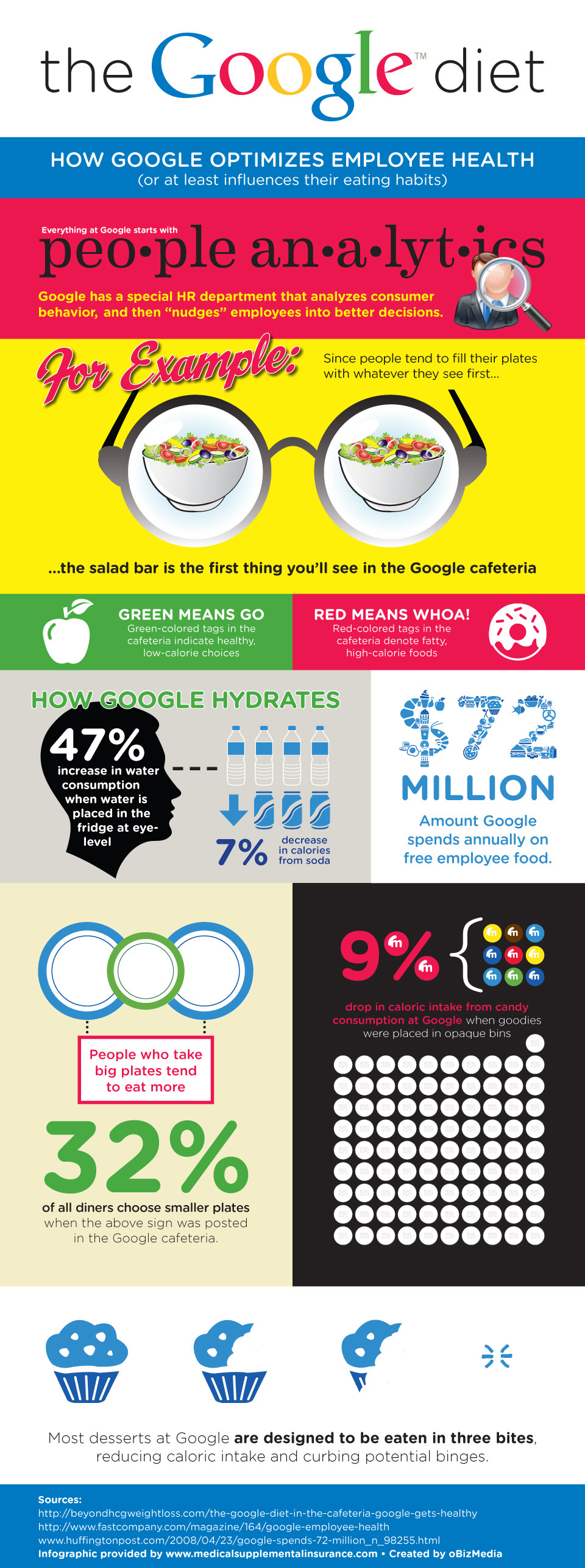Weight Loss/Maintenance
Related: About this forumThe Google Diet - How Google optimizes employee health (dial-up warning: large image)

noamnety
(20,234 posts)If their goal is to reduce candy and dessert consumption, why are they providing it at all? Why not allow employees to bring it from home if they want to, but not become directly responsible for becoming peddlers for it?
When I ran a high school lunch program, I just didn't provide desserts since it's not healthy for students to develop a habit of having dessert with lunch.
auntAgonist
(17,252 posts)that 'normal' eating can and does include dessert.
Deprivation isn't always the best diet strategy.
just my 2c.
aA
noamnety
(20,234 posts)includes a dessert at all meals. Normal in terms of an American diet, sure. That's why we have an epidemic of being overweight and having diabetes. But historically (long term) and internationally, no, it's not normal to pack a few hundred calories of pure junk into all our meals.
auntAgonist
(17,252 posts)wrong with it being provided though. And, the portion sizes are bite size. Ok, so there's nothing to stop someone from eating more than 1 or two bites of dessert but I do think personal responsibility has to play into it.
I'm not sure that I would agree with your assertion that dessert is responsible for the epidemic though. There's so much more to it than that.
aA
noamnety
(20,234 posts)but there is a prevailing thing that every employer provided meal includes dessert, and I've noticed almost everyone will take it if it's offered. It goes along with the idea that we can only eat vegetables if they are coated with fats. I saw someone on a diet forum ask for what kind of dip they should use if they want to eat raw cauliflower - like the idea of just eating a plain vegetable didn't occur to them.
Portion sizes, carbs as the mainstay of each meal, and sweetened beverages are also right up there for contributing to the epidemic. I also wondered about google deciding they don't want employees to buy soda, so they don't put that at eye level. There's another option!
a lot of raw vegetables are pretty bland unless they're adulterated in some way. That's JMO.
People on weight loss plans have to learn how to live around temptation. The world is not going to change because I'm on a weight loss plan. I DO keep m&m's around the house. They are parceled out into 100 calorie servings. If I'm craving chocolate, I have one serving, and drink some water. I must say in the house I grew up in, it was all meat and potatoes all the time. Dessert was not served as a regular part of any meal. I still don't eat dessert. On my birthday, yeah. The biggest piece of key lime pie I can find.
Goblinmonger
(22,340 posts)I have lost 100 pounds in the past year and a half. This time around things are going much better because I am focused on eating like I need to for the rest of my life and not being on a diet. Regular people have dessert once in a while. The difference between them and me of the past is that they would have a little and I would have a lot. Now, I can either go cold turkey and probably fall off the wagon hard, or I can learn to actually eat it in moderation. I don't need to completely cut out what I like to eat just learn how to eat it reasonably.
As to high school students, I see it like cell phones. So many want to ban them instead of teaching them how to use them responsibly.
noamnety
(20,234 posts)I'm just suggesting that they don't need to be a distributor. There's a big difference there.
though I don't think dessert, as we know it today, is particularly a good thing. The prevalence of dessert today is a result of processed sugar and is really quite detrimental to our health and well being...
from Wikipedia
"The word comes from the French language as dessert and this from Old French desservir, "to clear the table" and "to serve." The etymology is linked to the medieval practice of a two part meal. During the first, nobles (at a high) and servants (separate) would eat together in the same room. During the second - dessert, the noble family would retreat in separate private quarters for an intimate part of the meal without servants. The food consumed during dessert included but was not limited to sweets"
"In ancient times, people enjoyed the food that was available. Ancient civilizations enjoyed the occasional treat of fruit or nuts rolled into honey. This, in essence, is considered the first candy. In general however, it wasn't until sugar was manufactured during the middle ages that people began to enjoy more sweets. Even then, sugar was so expensive that it was a treat reserved only for the wealthy on special occasions. However, starting in about 3000BC there is a discernible and traceable history of many of the foods that delight the sweet tooth"